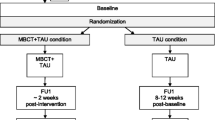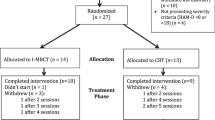Abstract
Major depressive disorder is often chronic and characterized by relapse and recurrence despite successful treatments to induce remission. Mindfulness-based cognitive therapy (MBCT) was developed as a means of preventing relapse for individuals in remission using cognitive interventions. In addition, MBCT has preliminarily been found to be useful in treating active depression. This current investigation is unique in evaluating the long-term outcome of individuals with active depression who achieved remission with MBCT. Eighteen participants who achieved remission after an 8-week MBCT group were seen for evaluation at a mean follow-up interval of 48.7 months (SD = 10.2) after completing treatment. The current study shows that in these participants, the gains achieved after the initial treatment including remission of depression, decreased rumination, decreased anxiety, and increased mindfulness continued for up to 58.9 months of follow-up. The data suggest that all levels of depression from less recurrent and mild to more recurrent and severe were responsive to MBCT. The average number of minutes per week of continued practice in our cohort was 210, but the number of minutes of practice did not correlate with depression outcomes. MBCT's effects may be more related to regularity of practice than specific quantity. This study provides a preliminary exploration of MBCT's long-term effects, which can aid in future research with a typically chronic illness.


Similar content being viewed by others
References
Beck, A. T., Steer, R. A., & Brown, G. K. (1996). Manual for Beck Depression Inventory—II. San Antonio, TX: Psychological Corporation.
Bieling, P. J., Hawley, L. L., Bloch, R. T., Corcoran, K. M., Levitan, R. D., Young, L. T., et al. (2012). "Treatment-specific changes in decentering following mindfulness-based cognitive therapy versus antidepressant medication or placebo for prevention of depressive relapse": Correction to bieling et al. (2012). Journal of Consulting and Clinical Psychology, 80(3), 372.
Birnie, K., Garland, S. N., & Carlson, L. E. (2010). Psychological benefits for cancer patients and their partners participating in Mindfulness-Based Stress Reduction (MBSR). [Research Support, Non-U.S. Gov't]. Psycho-Oncology, 19(9), 1004–1009.
Buchheld, N., Grossman, P., & Walach, H. (2001). Measuring mindfulness in insiight meditation (Vipassana) and meditation-based psychotherapy. Freiburg: Peter Lang.
Carmody, J., Baer, R. A., Lykins, E. L. B., & Olendzki, N. (2009). An empirical study of the mechanisms of mindfulness in a mindfulness-based stress reduction program. Journal of Clinical Psychology, 65(6), 613–626.
Chambers, R., Gullone, E., & Allen, N. B. (2009). Mindful emotion regulation: an integrative review. Clinical Psychology Review, 29(6), 560–572.
Davidson, R. J., Kabat-Zinn, J., Schumacher, J., Rosenkranz, M., Muller, D., Santorelli, S. F., et al. (2003). Alterations in brain and immune function produced by mindfulness meditation. Psychosomatic Medicine, 65(4), 564–570.
Eisendrath, S. J., Delucchi, K., Bitner, R., Fenimore, P., Smit, M., & McLane, M. (2008). Mindfulness-based cognitive therapy for treatment-resistant depression: a pilot study. Psychotherapy and Psychosomatics, 77(5), 319–320.
Fava, G. A., & Ruini, C. (2002). Long-term treatment of depression: there is more than drugs. Recenti Progressi in Medicina, 93(6), 343–345.
Fava, G. A., Savron, G., Grandi, S., & Rafanelli, C. (1997). Cognitive-behavioral management of drug-resistant major depressive disorder. The Journal of Clinical Psychiatry, 58(6), 278–282. quiz 283-274.
Fava, G. A., Rafanelli, C., Grandi, S., Conti, S., & Belluardo, P. (1998). Prevention of recurrent depression with cognitive behavioral therapy: preliminary findings. Archives of General Psychiatry, 55(9), 816–820.
Finucane, A., & Mercer, S. W. (2006). An exploratory mixed methods study of the acceptability and effectiveness of mindfulness-based cognitive therapy for patients with active depression and anxiety in primary care. BMC Psychiatry, 6, 14.
Godfrin, K. A., & van Heeringen, C. (2010). The effects of mindfulness-based cognitive therapy on recurrence of depressive episodes, mental health and quality of life: a randomized controlled study. Behaviour Research and Therapy, 48(8), 738–746.
Judd, L. L., Akiskal, H. S., Zeller, P. J., Paulus, M., Leon, A. C., Maser, J. D., et al. (2000). Psychosocial disability during the long-term course of unipolar major depressive disorder. Archives of General Psychiatry, 57(4), 375–380.
Keller, M. B., Lavori, P. W., Friedman, B., Nielsen, E., Endicott, J., McDonald-Scott, P., et al. (1987). The longitudinal interval follow-up evaluation: a comprehensive method for assessing outcome in prospective longitudinal studies. Archives of General Psychiatry, 44(6), 540–548.
Kenny, M. A., & Williams, J. M. (2007). Treatment-resistant depressed patients show a good response to mindfulness-based cognitive therapy. Behaviour Research and Therapy, 45(3), 617–625.
Kuyken, W., Byford, S., Taylor, R. S., Watkins, E., Holden, E., White, K., et al. (2008). Mindfulness-based cognitive therapy to prevent relapse in recurrent depression. Journal of Consulting and Clinical Psychology, 76(6), 966–978.
Ma, S. H., & Teasdale, J. D. (2004). Mindfulness-based cognitive therapy for depression: replication and exploration of differential relapse prevention effects. Journal of Consulting and Clinical Psychology, 72(1), 31–40.
Manicavasgar, V., Parker, G., & Perich, T. (2011). Mindfulness-based cognitive therapy Vs cognitive behaviour therapy as a treatment for non-melancholic depression. Journal of Affective Disorders, 130(1–2), 138–144.
Mathew, K. L., Whitford, H. S., Kenny, M. A., & Denson, L. A. (2010). The long-term effects of mindfulness-based cognitive therapy as a relapse prevention treatment for major depressive disorder. Behavioural and Cognitive Psychotherapy, 38(05), 561–576.
McPherson, S., Cairns, P., Carlyle, J., Shapiro, D. A., Richardson, P., & Taylor, D. (2005). The effectiveness of psychological treatments for treatment-resistant depression: a systematic review. Acta Psychiatrica Scandinavica, 111(5), 331–340.
Nolen-Hoeksema, S. (2000). The role of rumination in depressive disorders and mixed anxiety/depressive symptoms. Journal of Abnormal Psychology, 109(3), 504–511.
Ramel, W., Goldin, P. R., Carmona, P., & McQuaid, J. R. (2004). The effects of mindulness meditation on cognitive processes and affect in patients with past depression. Cognitive Therapy and Research, 28(4), 433–455.
Reeves, G. M., Rohan, K. J., Langenberg, P., Snitker, S., & Postolache, T. T. (2012). Calibration of response and remission cut-points on the beck depression inventory-second edition for monitoring seasonal affective disorder treatment outcomes. Journal of Affective Disorders, 138(1), 123–127.
Riedel, M., Möller, H.-J., Obermeier, M., Schennach-Wolff, R., Bauer, M., Adli, M., et al. (2010). Response and remission criteria in major depression—a validation of current practice. Journal of Psychiatric Research, 44(15), 1063–1068.
Roberts, J. E., Gilboa, E., & Gotlib, I. H. (1998). Ruminative response style and vulnerability to episodes of dysphoria: gender, neuroticism, and episode duration. Cognitive Therapy and Research. Special Issue: Cognitive Processes and Vulnerability to Affective Problems, 22(4), 401–423.
Robins, C. J., Keng, S. L., Ekblad, A. G., & Brantley, J. G. (2012). Effects of Mindfulness-Based Stress Reduction on Emotional Experience and Expression: a randomized controlled trial. Journal of Clinical Psychology, 68(1), 117–131.
Segal, Z., Williams, J. M., & Teasdale, J. (2002). Mindfulness-Based Cognitive Therapy for depression. New York: The Guilford.
Segal, Z. V., Bieling, P., Young, T., MacQueen, G., Cooke, R., Martin, L., et al. (2010). Antidepressant monotherapy vs sequential pharmacotherapy and mindfulness-based cognitive therapy, or placebo, for relapse prophylaxis in recurrent depression. Archives of General Psychiatry, 67(12), 1256–1264.
Shapiro, S. L., Oman, D., Thoresen, C. E., Plante, T. G., & Flinders, T. (2008). Cultivating mindfulness: effects on well-being. Journal of Clinical Psychology, 64(7), 840–862.
Sheehan, D. V., Lecrubier, Y., Sheehan, K. H., Amorim, P., Janavs, J., Weiller, E., et al. (1998). The Mini-International Neuropsychiatric Interview (M.I.N.I.): the development and validation of a structured diagnostic psychiatric interview for DSM-IV and ICD-10. The Journal of Clinical Psychiatry, 59(Suppl 20), 22–33. quiz 34-57.
Simon, G. E., Vonkorff, M., Ustun, T. B., Gater, R., Gureje, O., & Sartorius, N. (1995). Is the Lifetime Risk of Depression actually increasing? Journal of Clinical Epidemiology, 48(9), 1109–1118.
Singer, A. R., & Dobson, K. S. (2007). An experimental investigation of the cognitive vulnerability to depression. Behaviour Research and Therapy, 45(3), 563–575.
Spielberger, C., Gorsuch, R. R., & Luchene, R. E. (1970). State-trait anxiety inventory. Palo Alto: Consulting Psychologists.
Stimpson, N., Agrawal, N., & Lewis, G. (2002). Randomised controlled trials investigating pharmacological and psychological interventions for treatment-refractory depression. systematic review. The British Journal of Psychiatry, 181, 284–294.
Teasdale, J. D. (1993). Emotion and two kinds of meaning: cognitive therapy and applied cognitive science. Behaviour Research and Therapy, 31(4), 339–354.
Teasdale, J., & Barnard, P. (1993). Affect, cognition and change: re-modelling depressive thought essays in cognitive psychology (p. 285). Hillsdale: Lawrence Erlbaum Associates, Inc.
Teasdale, J. D., Segal, Z., & Williams, J. M. (1995). How does cognitive therapy prevent depressive relapse and why should Attentional Control (Mindfulness) Training help? Behaviour Research and Therapy, 33(1), 25–39.
Teasdale, J. D., Segal, Z. V., Williams, J. M., Ridgeway, V. A., Soulsby, J. M., & Lau, M. A. (2000). Prevention of relapse/recurrence in major depression by mindfulness-based cognitive therapy. Journal of Consulting and Clinical Psychology, 68(4), 615–623.
Acknowledgments
Dr. Eisendrath’s work was supported by grant R01AT004572–01A1 968 from the National Center for Complementary and Alternative Medicine of the National Institutes of Health.
Author information
Authors and Affiliations
Corresponding author
Rights and permissions
About this article
Cite this article
Munshi, K., Eisendrath, S. & Delucchi, K. Preliminary Long-Term Follow-up of Mindfulness-Based Cognitive Therapy-Induced Remission of Depression. Mindfulness 4, 354–361 (2013). https://doi.org/10.1007/s12671-012-0135-0
Published:
Issue Date:
DOI: https://doi.org/10.1007/s12671-012-0135-0




